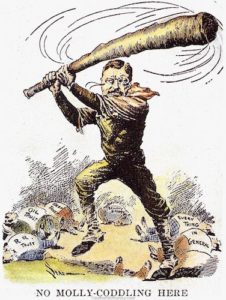How can a Code of Ethics Violate Antitrust Law?

The US Department of Justice is currently investigating the ethics code of the National Association for College Admission Counseling (NACAC). Specifically, they are looking into whether the Code of Ethics of Professional Practices (CEPP), formerly known as the Statement of Principles and Good Practice (SPGP), violates federal antitrust law. The concern is whether there has been a general agreement among colleges and universities to restrain trade in the recruitment of students.
What is this all about? How can the government be against ethics? How does antitrust law even apply to higher education? Let us start with a brief primer on antitrust law.
Busting the Trusts

This cartoon from 1904 shows President Roosevelt using the Act to break up railroad, beer, oil, and other trusts.
In the late 1800s, many giant corporations in the US (called trusts) were monopolizing their various industries, and using that power to control prices and stifle competition. Ohio Senator John Sherman believed that this was harming the country, and spearheaded the Anti-Trust Act of 1890, which made agreements “in restraint of trade” illegal.
Over the years, the pendulum has swung back and forth. Some pro-business administrations have cut back on enforcement of antitrust law (e.g. Reagan) while others have stepped it up (e.g. Obama). There is growing evidence that corporate power is too high right now. We are seeing increased consolidation of drug companies, cable providers, health insurers, and airlines. The Department of Justice is ramping up enforcement, and as recently as November filed suit to block AT&T’s takeover of Time Warner.
The essential idea behind antitrust law is straightforward: It is a violation whenever an organization (or group of organizations) has a monopoly or a high degree of market power, and engages in behavior that makes it difficult or impossible for new entrants in the market.
What about the CEPP?
How could the the CEPP run afoul of antitrust laws? Think of it this way: The CEPP is an agreement among multiple education institutions, dictating policies that limit the actions institutions can take in advising or recruiting students. The CEPP rules limit the nature of incentives that can be offered, the kinds of marketing statements that can be made, and deadlines for accepting admission offers, scholarships, and housing. From the perspective of the Department of Justice, it could look a little like an antitrust violation, especially considering that tuition fees are rising around the country.
Mixed Feelings
As an entrepreneur providing counseling technology to high schools and students, I can see both sides of this. The educator in me appreciates the CEPP. When it comes to counseling and student recruitment, young students are making a major life decision and large amounts of money are involved. Given the high stakes, it is important that the industry have a moral foundation and a widely followed code of conduct.
But the economist in me sees another side. I believe in free markets. I acknowledge that in most industries, healthy competition demands a certain amount of regulation to maintain a level playing field, but I feel it should be kept to a minimum. The goal is to minimize barriers to entry for new market entrants, so that consumers can have a range of choices, and enough information to make informed decisions. Beyond that, additional legislation is harmful.
Does the CEPP overreach? Does it unnecessarily limit the commercial options for new education providers to enter the market and compete? Maybe.
National Decision Day: May 1
 Let us take a closer look at one of the CEPP rules, the May 1 deadline. This rule supports the ethical principle that students should be able to make an informed college choice without undue coercion or manipulation. Students should be able to receive decisions from all the colleges to which they applied, and each should have time to compare the pros and cons of their options before choosing the best fit.
Let us take a closer look at one of the CEPP rules, the May 1 deadline. This rule supports the ethical principle that students should be able to make an informed college choice without undue coercion or manipulation. Students should be able to receive decisions from all the colleges to which they applied, and each should have time to compare the pros and cons of their options before choosing the best fit.
But the CEPP also allows universities to offer Early Decision (ED) plans, which are in violation of that principle. Such plans give students a benefit (preferential consideration) in exchange for early commitment. Students value ED plans because they can get admitted to better programs, and universities value them because they help with enrollment planning.
How can the May 1 deadline and ED plans both be ethical? If we believe that students have a right to know their options before having to make their college choice (the moral basis for the May 1 deadline), then how do we justify allowing ED plans? I think the truth is that we allow them because there is demand for such plans from students and universities, and the CEPP is trying to be pragmatic and remain relevant. But that undermines the moral foundation behind the May 1 deadline. If we are going to allow variances, why not allow colleges and universities to invent whatever plans they want, as long as they are clearly explained to students?
The Department of Justice might well take that position and argue that while NACAC is free to define and recommend ED and any other standard enrollment plans, it is not entitled to penalize higher education institutions for trying something different.
The Bottom Line
While US colleges and universities face plenty of challenges, and notwithstanding concerns about the May 1 deadline, ED, and other CEPP rules, I think on balance, NACAC and the CEPP help strengthen the US education brand more than they are hindering institutions’ commercial flexibility.
But from an antitrust perspective, the Department of Justice will be asking the question: Is NACAC making it too hard for new colleges and universities to compete? With several Department of Justice leadership nominations still to come from President Trump, it is anybody’s guess how the investigation will play out.
About the Author
 Joe Morrison founded Concourse with the ambition to provide students around the world with universal access to powerful, unbiased tools to help them make better decisions regarding their higher education. An MIT graduate with over twenty years of experience as a technology entrepreneur and business leader, Joe previously founded e-smith, inc. (acquired by Mitel Networks), built advanced trading platforms for the world’s largest banks at Lab49 in New York, and led business development at Grok Global Services, the leading provider of strategic consulting and in-country marketing services for universities.
Joe Morrison founded Concourse with the ambition to provide students around the world with universal access to powerful, unbiased tools to help them make better decisions regarding their higher education. An MIT graduate with over twenty years of experience as a technology entrepreneur and business leader, Joe previously founded e-smith, inc. (acquired by Mitel Networks), built advanced trading platforms for the world’s largest banks at Lab49 in New York, and led business development at Grok Global Services, the leading provider of strategic consulting and in-country marketing services for universities.
About Concourse
Concourse is a free user-friendly online tool designed to help high school counselors find best-fit university programs for their students. Students are empowered to think creatively about their futures, and based on their unique interests and academic background, Concourse delivers program recommendations specific to their ambitions, with clear rationales. Counselors are able to track the progress of each student during the search process and can provide additional information to fine-tune program recommendations. Visit concourse.global for more information.
